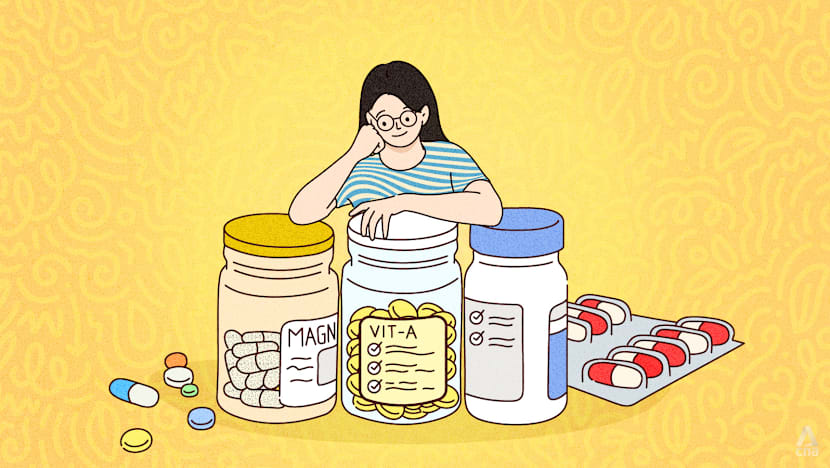Health
Experts Weigh In: Do You Really Need Dietary Supplements?

The necessity of dietary supplements in achieving optimal health has become a topic of considerable debate. Many individuals are exploring the role of supplements in enhancing energy, improving skin clarity, and promoting better sleep. With a plethora of options available, it raises the question: are these supplements essential for maintaining health, or can a balanced diet suffice?
Adulthood presents a series of challenges, from managing finances to maintaining healthy relationships. In navigating these complexities, nutritional health often becomes a concern. Personal experiences, such as grappling with iron-deficiency anemia, can highlight the importance of understanding dietary requirements. This condition, marked by low iron levels, may necessitate supplementation, as was the case for many individuals who find themselves fatigued or unwell.
According to Dr. Kalpana Bhaskaran, president of the Singapore Nutrition and Dietetics Association (SNDA), a well-planned, nutrient-rich diet generally meets the nutritional needs of most healthy adults. She stresses that supplements should not replace whole foods, which offer essential components—like fiber and phytonutrients—that supplements cannot replicate. Whole foods encompass minimally processed items, including vegetables, fruits, dairy products, and lean proteins.
Dr. Alvin Wong, a senior principal research dietitian at Changi General Hospital (CGH), reinforces this perspective by stating that food should be prioritized. While supplements can address specific nutritional gaps, they should not be viewed as a means to enhance an already healthy diet.
Understanding the Role of Supplements
Experts acknowledge that there are situations where supplementation may be beneficial. For instance, as individuals age or face specific health challenges, their nutritional needs may change. Ms. Rachel Tok, a dietitian at the National University Hospital (NUH), explains that changes in the gastrointestinal tract can reduce nutrient absorption, particularly in those over 40. Common deficiencies among older adults include vitamin D, vitamin B12, calcium, and iron.
Despite these challenges, Ms. Tok emphasizes that older adults can still meet their nutritional needs by consuming nutrient-rich foods. For example, dairy products can enhance calcium intake, while fatty fish and fortified juices can boost vitamin D levels. However, if dietary adjustments are insufficient, supplementation may be necessary.
Dr. Bhaskaran advises against self-prescribing supplements as quick fixes for health symptoms. It is crucial first to assess diet and lifestyle factors such as inadequate sleep, stress, and hydration. If symptoms persist beyond two to three weeks, individuals should consult a healthcare provider for clinical evaluations and blood tests to identify specific nutrient deficiencies.
Choosing the Right Supplements
For those who require supplementation, selecting the right products is critical. Dr. Bhaskaran suggests checking for brand transparency and quality-control standards. Reputable companies often publish certificates of analysis from independent laboratories, ensuring the purity and potency of their products. She advocates for looking for third-party testing certifications, such as “USP Verified” or “NSF Certified,” which affirm a supplement’s safety.
Consumers should remain cautious of exaggerated claims, particularly those promising miraculous results. Supplements that are unusually inexpensive may also compromise quality, as lower prices often reflect inferior raw materials.
Moreover, the common misconception that taking more supplements equates to better health can be misleading. Megadosing—consuming vitamins or minerals at levels well above recommended amounts—can lead to toxicity. For instance, excess vitamin A can result in severe symptoms, including nausea and liver damage.
Dr. Wong highlights the importance of integrating comprehensive lifestyle modifications, such as maintaining a balanced diet, ensuring adequate protein intake, and engaging in regular physical activity, for optimal health. Research consistently shows that these lifestyle changes provide far greater benefits than any individual supplement.
In conclusion, while dietary supplements can serve as supportive tools for specific deficiencies, they should not replace a well-rounded diet. Adopting a holistic approach that prioritizes whole foods and lifestyle modifications is essential for achieving and maintaining long-term health.
-

 World5 months ago
World5 months agoSouth Korea’s Foreign Minister Cho Hyun to Visit China This Week
-

 Business5 months ago
Business5 months agoStarling Bank Plans Secondary Share Sale, Targeting $5.4 Billion Valuation
-

 Top Stories5 months ago
Top Stories5 months agoMunsang College Celebrates 100 Years with Grand Ceremony
-

 World5 months ago
World5 months agoPAS Aims to Expand Parliamentary Influence in Upcoming Election
-

 Business7 months ago
Business7 months agoKenvue Dismisses CEO Thibaut Mongon as Strategic Review Advances
-

 Lifestyle6 months ago
Lifestyle6 months agoHumanism Camp Engages 250 Youths in Summer Fest 2025
-

 Sports6 months ago
Sports6 months agoDe Minaur Triumphs at Washington Open After Thrilling Comeback
-

 Sports7 months ago
Sports7 months agoTupou and Daugunu Join First Nations Squad for Lions Clash
-

 Top Stories7 months ago
Top Stories7 months agoColombian Senator Miguel Uribe Shows Signs of Recovery After Attack
-

 World7 months ago
World7 months agoASEAN Gears Up for Historic Joint Meeting of Foreign and Economic Ministers
-

 Health6 months ago
Health6 months agoNew Study Challenges Assumptions About Aging and Inflammation
-

 Business7 months ago
Business7 months agoOil Prices Surge Following New EU Sanctions on Russia









